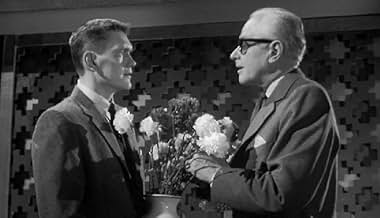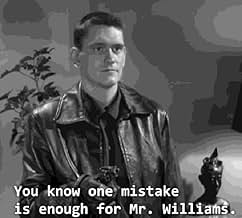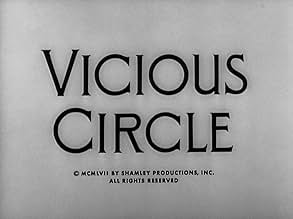A hired killer reluctantly sets out to kill his own girlfriend as ordered by his crime boss, a man who won't tolerate failure.A hired killer reluctantly sets out to kill his own girlfriend as ordered by his crime boss, a man who won't tolerate failure.A hired killer reluctantly sets out to kill his own girlfriend as ordered by his crime boss, a man who won't tolerate failure.
- Director
- Writers
- Stars
- Director
- Writers
- All cast & crew
- Production, box office & more at IMDbPro
Featured reviews
A Risky Departure
Younger viewers may not be aware of how forbidden the whole topic of homosexuality was in both movies and TV of the 1950's. In short, the topic was treated as though it simply didn't exist. A more obvious censorship example is the A-budget Cat on a Hoot Tin Roof (1958) in which the theme from the Tennessee Williams play is airbrushed from the screenplay, rendering the movie itself darn near incomprehensible. Now, I'm sure I saw this Hitchcock entry the first time around, but it was only on recent viewing that the subtext jumped out at me. Then too, I don't see how the innuendo could have been unintentional on the part of writer and producer, which makes me wonder why such a risk with time and money was taken. I expect there is an inside story here. But what would it be, except as another instance of this cutting-edge series pushing the envelope.
Excellent episode dealing with important themes
Excellent plot
Murder For Hire
The episode is also vague as to the precise nature of its villain's apparently small and tidy empire of crime. Is it a hit man for hire service,--that's all? It appears that way. Yet honcho George Macready seems an incongruously patrician and Ivy League type to be running such an enterprise.
That Macready's character comes off as unambiguously gay makes the episode unique but doesn't raise it in quality. His hit men,--nearer to hit boys, it appears, as they're all quite young--are, it's inferred in the script but not stated outright, his boy toys as well. He appears jealous of his new kid on the block Dick York's girlfriend, who's also threatening to start a one woman campaign against him and his criminal operation, and he orders York to kill her!
This is where the episode falls apart in feeling unreal and contrived. It shies away from the provocativeness inherent in its setup in favor of extreme and difficult to swallow melodrama. That the story is melodrama to begin with makes this "doubling up" of improbabilities too much for it to bear. The ending feels both telegraphed and hurried.
Still, flawed as it is, there are good things in this one, among them the performances of Dick York, an unlikely seeming criminal at first, especially if one is familiar with his later work in comedy, he handles his part well; and George Macready, with his sunglasses,--nicely suggestive of his lifestyle of concealment and secrecy--and his need for eye drops, symbolic of moral blindness and possibly sexual difficulties most of us would rather not dwell upon.
He Could Have Got a Job Playing Darren!
Did you know
- TriviaLast role of Mickey Kuhn. Additionally, his two previous roles were also for Alfred Hitchcock Presents in back-to-back showings, all in the same season: The End of Indian Summer (1957) and One for the Road (1957).
- GoofsMr. Williams says that Christmas is the day after tomorrow, so it is December 23rd when he gives Manny a job to complete. In a later scene, he says it has been a week since their last discussion, therefore, it must be December 30th. In this scene, Mr. Williams says that New Years Eve is a few days away when it is actually the next day.
- Quotes
Vincent Williams: People with rash ideas must be put away for their own good.
Manny Coe: I don't get it.
Vincent Williams: Really, Manny. Come now, you're not that naïve.
Manny Coe: But she loves me, Mr. Williams.
Vincent Williams: That's the beauty of it. To triumph over that little impediment of love. And after it's done, Manny, think of the elation. Free from emotional annoyances.
- SoundtracksFuneral March of a Marionette
Written by Charles Gounod
Details
- Runtime
- 30m
- Color
- Aspect ratio
- 1.33 : 1
















